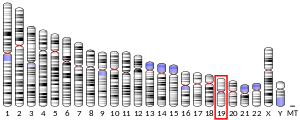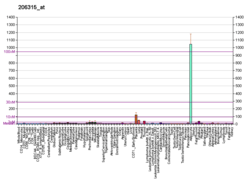CRLF1
Cytokine receptor-like factor 1 is a protein that in humans is encoded by the CRLF1 gene.[5][6]
Function
This gene encodes a member of the cytokine type I receptor family. The protein forms a secreted complex with cardiotrophin-like cytokine factor 1 and acts on cells expressing ciliary neurotrophic factor receptors. The complex can promote survival of neuronal cells.[6]
Clinical significance
Mutations in this gene are associated with two conditions, both rare:
- Cold-induced sweating syndrome, characterized by profuse hyperhidrosis in cold environmental temperature and characteristic craniofacial and skeletal features)[7][8]
- Crisponi syndrome (CS), characterized by neonatal-onset paroxysmal muscular contractions, abnormal function of the autonomic nervous system and craniofacial and skeletal manifestations such as thick and arched eyebrows, a short nose with anteverted nostrils, full cheeks, an inverted upper lip and a small mouth.[7]
It is unknown whether the two conditions are distinct clinical entities or a single clinical entity with variable expressions.[7] Other characteristic features in CRLF1 mutation include marfanoid habitus with progressive kyphoscoliosis and craniofacial characteristics including dolichocephaly, a slender face with poor expression, a nose with hypoplastic nares, malar hypoplasia and prognathism.[7]
References
- GRCh38: Ensembl release 89: ENSG00000006016 - Ensembl, May 2017
- GRCm38: Ensembl release 89: ENSMUSG00000007888 - Ensembl, May 2017
- "Human PubMed Reference:". National Center for Biotechnology Information, U.S. National Library of Medicine.
- "Mouse PubMed Reference:". National Center for Biotechnology Information, U.S. National Library of Medicine.
- Elson GC, Graber P, Losberger C, Herren S, Gretener D, Menoud LN, Wells TN, Kosco-Vilbois MH, Gauchat JF (Aug 1998). "Cytokine-like factor-1, a novel soluble protein, shares homology with members of the cytokine type I receptor family". J Immunol. 161 (3): 1371–9. PMID 9686600.
- "Entrez Gene: CRLF1 cytokine receptor-like factor 1".
- Yamazaki M, Kosho T, Kawachi S, Mikoshiba M, Takahashi J, Sano R, Oka K, Yoshida K, Watanabe T, Kato H, Komatsu M, Kawamura R, Wakui K, Knappskog PM, Boman H, Fukushima Y (March 2010). "Cold-induced sweating syndrome with neonatal features of Crisponi syndrome: longitudinal observation of a patient homozygous for a CRLF1 mutation". Am. J. Med. Genet. A. 152A (3): 764–9. doi:10.1002/ajmg.a.33315. PMID 20186812.
- Rousseau F, Gauchat JF, McLeod JG, Chevalier S, Guillet C, Guilhot F, Cognet I, Froger J, Hahn AF, Knappskog PM, Gascan H, Boman H (June 2006). "Inactivation of cardiotrophin-like cytokine, a second ligand for ciliary neurotrophic factor receptor, leads to cold-induced sweating syndrome in a patient". Proc. Natl. Acad. Sci. U.S.A. 103 (26): 10068–73. doi:10.1073/pnas.0509598103. PMC 1502507. PMID 16782820.
Further reading
- Elson GC, Lelièvre E, Guillet C, et al. (2000). "CLF associates with CLC to form a functional heteromeric ligand for the CNTF receptor complex". Nat. Neurosci. 3 (9): 867–72. doi:10.1038/78765. PMID 10966616.
- Lelièvre E, Plun-Favreau H, Chevalier S, et al. (2001). "Signaling pathways recruited by the cardiotrophin-like cytokine/cytokine-like factor-1 composite cytokine: specific requirement of the membrane-bound form of ciliary neurotrophic factor receptor alpha component". J. Biol. Chem. 276 (25): 22476–84. doi:10.1074/jbc.M101681200. PMID 11294841.
- Strausberg RL, Feingold EA, Grouse LH, et al. (2003). "Generation and initial analysis of more than 15,000 full-length human and mouse cDNA sequences". Proc. Natl. Acad. Sci. U.S.A. 99 (26): 16899–903. doi:10.1073/pnas.242603899. PMC 139241. PMID 12477932.
- Knappskog PM, Majewski J, Livneh A, et al. (2003). "Cold-induced sweating syndrome is caused by mutations in the CRLF1 gene". Am. J. Hum. Genet. 72 (2): 375–83. doi:10.1086/346120. PMC 379230. PMID 12509788.
- Clark HF, Gurney AL, Abaya E, et al. (2003). "The secreted protein discovery initiative (SPDI), a large-scale effort to identify novel human secreted and transmembrane proteins: a bioinformatics assessment". Genome Res. 13 (10): 2265–70. doi:10.1101/gr.1293003. PMC 403697. PMID 12975309.
- Heese K, Yamada T, Akatsu H, et al. (2005). "Characterizing the new transcription regulator protein p60TRP". J. Cell. Biochem. 91 (5): 1030–42. doi:10.1002/jcb.20010. PMID 15034937.
- Zhang Z, Henzel WJ (2005). "Signal peptide prediction based on analysis of experimentally verified cleavage sites". Protein Sci. 13 (10): 2819–24. doi:10.1110/ps.04682504. PMC 2286551. PMID 15340161.
- Gerhard DS, Wagner L, Feingold EA, et al. (2004). "The status, quality, and expansion of the NIH full-length cDNA project: the Mammalian Gene Collection (MGC)". Genome Res. 14 (10B): 2121–7. doi:10.1101/gr.2596504. PMC 528928. PMID 15489334.
- Dagoneau N, Bellais S, Blanchet P, et al. (2007). "Mutations in cytokine receptor-like factor 1 (CRLF1) account for both Crisponi and cold-induced sweating syndromes". Am. J. Hum. Genet. 80 (5): 966–70. doi:10.1086/513608. PMC 1852726. PMID 17436251.
- Crisponi L, Crisponi G, Meloni A, et al. (2007). "Crisponi syndrome is caused by mutations in the CRLF1 gene and is allelic to cold-induced sweating syndrome type 1". Am. J. Hum. Genet. 80 (5): 971–81. doi:10.1086/516843. PMC 1852730. PMID 17436252.
External links
- GeneReviews/NCBI/NIH/UW entry on Cold-Induced Sweating Syndrome including Crisponi Syndrome
- OMIM enries on Cold-Induced Sweating Syndrome including Crisponi Syndrome
- Human CRLF1 genome location and CRLF1 gene details page in the UCSC Genome Browser.
This article incorporates text from the United States National Library of Medicine, which is in the public domain.




